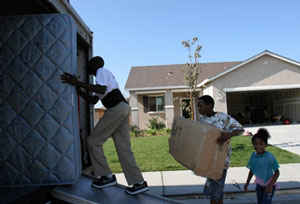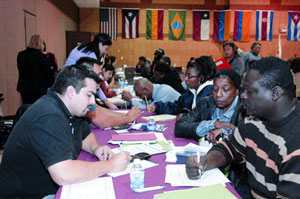America's economic downturn
By Ashahed M. MuhammadAssistant Editor | Last updated: Apr 11, 2008 - 3:41:00 PM
What's your opinion on this article?
Is the worst yet to come?

James Hollins and his family move out of a rental home in the Rancho Encantado subdivision after their rent was raised. Unable to sell the home, Janette Hollins says, the owner turned it into a rental. The Hollins say the neighborhood has gone downhill with so many foreclosed homes sitting vacant; vandalism and crime have increased they say. The Central Valley has the highest foreclosure rate in the country, with over 4,000 foreclosures in Modesto alone. Exotic loans made it possible for many low-wage workers and immigrants to purchase homes beyond their means. Photo: Nicole Hill/The Christian Science Monitor
|
Though the subprime lending crisis is the latest economic factor affecting a large number of Americans, other factors such as the rising price of oil, government budgets strained by costs of natural disasters and the increasing debt caused by the mounting cost of the Iraq War are wreaking havoc on America’s economy. Economic confidence is low and significant numbers of American tax payers are feeling pinched even if they are unable to explain it.
There are also questions about how deep the economic crisis will go and how much Americans really understand about what is going on.
In the book A Torchlight for America the Honorable Minister Louis Farrakhan wrote: “Most politicians are afraid to tell the full extent of the truth that America has seriously mortgaged her future, and that to reduce the deficit will require a great sacrifice.”
In a new book titled, The Three Trillion Dollar War by Joseph Stiglitz and Linda Bilmes, their research found that the Bush administration lowballed the estimated cost of the Iraq War saying that it would run between $50 and $60 billion. Before the war, former Secretary of Defense Donald Rumsfeld reportedly scoffed at the estimates of other economic advisers who said the cost could approach $200 billion. Former Deputy Defense Secretary Paul Wolfowitz, who many consider to be the primary architect of the Iraq War, suggested Iraq’s oil revenues would finance post-war reconstruction. This has yet to materialize and the cost of the war is being shouldered by American taxpayers.
In fiscal year 2008 alone, the Bush administration has asked for $200 billion in financing approval from Congress. The government’s latest estimate has placed the cost of the Iraq War at around $600 billion. Still other financial analysts have placed the long-term cost at between $2 and $4 trillion.
The recent financial troubles of Bear Stearns prompted an emergency bail out by the Federal Reserve and JP Morgan Chase & Co. to avoid what many financial analysts predicted could have been a total economic collapse of financial markets. Another troubled lender, Countrywide Financial Corporation was rocked by allegations of financial irresponsibility and possible impropriety leading to a downward spiral in stock prices. Well known companies such as Morgan Stanley, Lehman Brothers, Merrill Lynch, Citigroup, UBS and Goldman Sachs are taking another look at their risky loan processes, analyzing industry trends, and closely monitoring their stock prices.

Georgia Snow was among Chicago participants in state-sponsored Homeowner Outreach Days to help Illinois residents facing foreclosure and loss of their homes. Photo: Kenneth Muhammad/
|
Those companies at the very high end of financial wealth management are intricately involved in the financial system of the United States. While losses are heavy among many financial lenders and investors, many are financially insulated from the consequences felt by the average American living paycheck to paycheck.
There is no universally accepted definition of a recession, however some negative economic indicators include a slowdown in economic activity, less consumer spending and increased unemployment. Despite the current existence of many of these indicators, there is hesitancy among economists and government officials to declare that America is in a recession for fear of widespread panic.
Managing Editor of Political Affairs magazine Joel Wendland is a frequent critic of the Bush administration’s fiscal policies. He said there are varying opinions of what an actual recession is, based on frame of reference.
“The economists I have interviewed talk about recession in different ways. Some who are oriented toward Wall Street see recessions as starting only when hard times hit Wall Street. Progressive economists talk about recession from the standpoint of the impact of (the) crisis on working families. One economist said workers haven’t really recovered from the 2001 recession as high unemployment figures, stagnant real wages, and the enormous cost of Bush-type polices—health care cuts, education cuts, tight state and local budgets, no new funding for anti-poverty programs, and so on—indicate that for millions of working families, disproportionately African-American, Latino, but also millions of White, the 2001 recession never went away,” said Mr. Wendland.
Ginna Green of the Center for Responsible Lending, an advocacy resource for predatory lending opponents, said ironically, the policies and practices of leading financial lenders have brought the American economy to the brink of collapse and caused a loss of economic confidence.
“We’ve got a major player (Bear Stearns) who has had a major hand in causing the problem getting a federal bailout and yet, we can’t do the same for every day hardworking Americans who were put into loans that shouldn’t have been offered in the first place,” said Ms. Green. “And we also know that African Americans and Latinos are disproportionately impacted because they got the bulk of these problem loans.”
According to the Center for Responsible Lending, more than 2 million families will face foreclosure in the next 24 to 36 months. Forty million families living in surrounding neighborhoods will feel the effects of these foreclosures as property values in their areas plunge by an estimated $350 billion.
In a separate joint study by several regional policy and advocacy groups titled “Paying More for the American Dream” released in March 2008, huge mortgage pricing disparities between loans granted to Black and Latino borrowers, and those granted to Whites was found. In their study of geographic lending patterns, they found this disparity was not limited to subprime mortgage loans but was prevalent among lending institutions granting conventional prime loans as well.
Even during times of greater economic stability, the unemployment rate of Blacks and Latinos is higher than that of Whites leading some experts to suggest the unemployment rate is actually higher than what is being reported.
“Because the government only counts people who are looking for work and who have applied for unemployment compensation benefits, the real figures of unemployed are much higher than reported. One report suggested that about 15 to 20 million jobs need to be created in our economy right now to take care of everyone who is out of work,” said Mr. Wendland.
Arewa L. Karen Winters, a prevention specialist and cultural programs coordinator at the Bobby E. Wright Comprehensive Community Behavior Health Center, Inc. in Chicago said the dire economic conditions within the Black and Latino communities are resulting in an increase in the abuse of drugs, alcohol, and the use of sex—especially among young people—as a result of what she called “a massive economic void” in the community.
“It’s an epidemic and if we don’t open our eyes and look at what is really going on in the community, it worries me and it troubles my spirit,” said Ms. Winters adding that her office has also seen an increase in violent behavior. “A lot of it is (because of) poverty. When you talk about a recession and young people who have no food at home, some of them have no lights or gas, that makes them angry and then they go out here and see other students dressing nice, it makes them angry, it makes them hostile,” said Ms. Winters.
Carole Grant Hall, the director of the West Englewood Neighborhood Housing Services in Chicago says the predominately Black neighborhood was one of the hardest hit by an “outrageous” foreclosure rate. The West Englewood NHS offers educational programs for first time home buyers, current home owners as well as those in danger or losing their homes.
“It’s having a lot of effect on property values, but even more so, its damaging our community and the people who are living there still,” said Ms. Grant Hall. There has been an increase of fires as result of homeless people using abandoned buildings and houses as squatters, she noted.
Viewing current trends and analyzing current statistics, Mr. Wendland concludes that more economic troubles are on the horizon. “It is my understanding that layoffs in housing and finance are still to come on a large scale. This is only going to be compounded by other serious underlying problems like long-term unemployment, inflation, and the like.”
Ms. Green agreed saying the worst part of the economic crisis, including continued foreclosures, and additional job loss is probably still yet to come. “It’s going to get worse before it gets better.”
INSIDE STORIES AND REVIEWS
-
-
About Harriett ... and the Negro Hollywood Road Show
By Rabiah Muhammad, Guest Columnist » Full Story -
Skepticism greets Jay-Z, NFL talk of inspiring change
By Bryan 18X Crawford and Richard B. Muhammad The Final Call Newspaper @TheFinalCall » Full Story -
The painful problem of Black girls and suicide
By Charlene Muhammad -National Correspondent- » Full Story -
Exploitation of Innocence - Report: Perceptions, policies hurting Black girls
By Charlene Muhammad -National Correspondent- » Full Story -
Big Ballin: Big ideas fuel a father’s Big Baller Brand and brash business sense
By Bryan Crawford -Contributing Writer- » Full Story






 Click Here Stay Connected!
Click Here Stay Connected!








